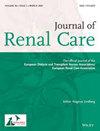Understanding nurses' perceptions of sexual health and function in people requiring haemodialysis
Abstract
Background
Sexual dysfunction is common for adults receiving chronic haemodialysis; however, renal nurses seldom discuss this topic with patients.
Objectives
This study aimed to identify renal nurses' attitudes towards providing sexual healthcare and to determine their confidence in discussing sexual dysfunction with adults who are receiving haemodialysis.
Design
An online cross-sectional study.
Participants
Renal nurses across Australia and New Zealand (n = 65) who were members of the Renal Society of Australasia provided direct care to adults receiving haemodialysis.
Measurements
Two questionnaires measuring (1) the frequency of sexual health discussions, levels of knowledge and competence, barriers to discussing sexual dysfunction and views on accountability (Van Ek survey) and (2) communication, practical knowledge, and attitude (sexual health educator for professionals scale) were used. Demographic characteristics were also collected.
Results
Most participants were females (60%) with postgraduate qualifications (61.4%). The average nephrology nursing experience was 13.10 ± 9.14 years. Most renal nurses identified as having positive attitudes (77.2%) about providing sexual healthcare and were confident in communicating with patients about sexual concerns (42.9%), although many nurses (64.35%) rarely did so. Less than one-half (48.6%) indicated feeling competent to discuss sexual dysfunction, and less than one-third (30%) had sufficient knowledge about sexual dysfunction. Barriers were lack of practical training (74.2%) and insufficient time (57.1%). Younger nurses (≤45 years old) and male nurses were significantly more confident in discussing sexual health matters.
Conclusions
Overall, renal nurses had positive attitudes towards discussing sexual health concerns with patients however they rarely did so.

 求助内容:
求助内容: 应助结果提醒方式:
应助结果提醒方式:


